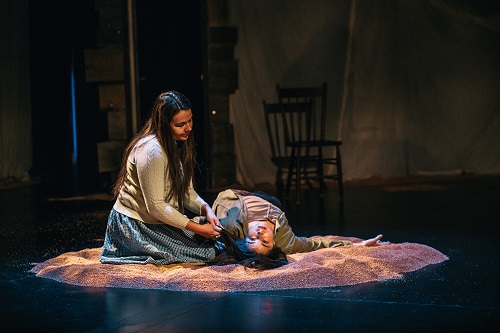 Harsh history and present day reality are explored in a new play now playing in Toronto
Harsh history and present day reality are explored in a new play now playing in Toronto
Ipperwash, onstage now at Native Earth, is a fictional story based on the true events of the Stoney Point reserve, which was forcibly moved to the neighbouring reserve of Kettle Point in 1942 by the federal Department of Defence. There they established Camp Ipperwash, a military training base, with the promise to return the land after the war was over. However, the area was left contaminated, riddled with land mines.
In the play, set in the present day, an army veteran who is also Indigenous named Bea (PJ Prudat), arrives, employed on the clean up. As she develops relationships with two of the people who live there, Tim Cloud (Jonathan Fisher) and his nephew Slip (James Dallas Smith), while also being visited by the ghost of Tim’s sister Kwe (Samantha Brown), she grows aware of the history of the land and the powerful toll it took on the people of Stoney Point.
Bea and Tim are are carefully crafted characters who manifest different relationships to military service. Bea is haunted by her experience of the war in Afghanistan, finding relief in her civilian contract, but still proud to be employed by Defense. Tim, who enlisted in World War II due to economic hardship, is haunted by what happened to his family while he was overseas, and rightfully feels animosity towards Defense.
The concept of “haunting” is given further dimension by the presence of Kwe. My companion was particularly impressed by the depiction of the ghost girl as being both ephemeral and corporeal at the same time. While only the audience sees Kwe herself, she moves objects (sand, a rock) that the other characters can see. She is also given a voice, which felt very important, as too many First Nations children were (and are) given no voice in Canadian society. The relationships between Kwe and Bea, and Kwe and Tim, are lovingly rendered, despite Kwe’s invisibility.
Comedic relief is threaded throughout the production, most often provided by the character of Slip. Slip’s attitude toward Defense goes straight to outright hostility, and he seems to find the existence of an Indigenous person voluntarily working for Defense to be confusing and fascinating. After demanding to see Bea’s status card, he claims he’ll allow her free access to the area – as he is self-appointed “security” – but instead follows her around. The understanding that grows between them is thankfully free of romance. (I’m tired of every opposite-gender relationship defaulting to one of love.)
The set was eerie and evocative. The house that Tim rents to Bea, which he hasn’t entered since before the war, is a doorway with rough hewn boards on one side, and a cream coloured scrim on the other. The same cream fabric lines the other edges of the stage. Across from the house is a small tower topped by a repurposed car seat, where Slip keeps a watchful eye out for trouble. The centre of the stage is a circle of sand (which I believe was actually wood chips) a metaphor for the land. The sand is used in many ways, but my favourite was simply the resonance of sand in hair: the show opens with Kwe in the circle, and later Bea lies in it; both times sand runs through hair, beautiful but also messy, like life is.
In Ipperwash, playwright Falen Johnson addresses the harsh history, and present day reality, we need to face if we intend to be serious about reconciliation. There are more stories out there of displacement of, and disregard for, First Nations communities, and we need to give voice to them, as Johnson has given voice to Kwe and her family.
Details
- Ipperwash, from Native Earth, is onstage now at the Aki Studio, 585 Dundas Street East until February 18
- Performances are Tuesday to Saturday at 8pm, with a Sunday matinee at 2 pm
- Tickets range from $15 to $25
- Purchase tickets online or at 416.531.1402
Photo of PJ Prudat and Samantha Brown by Kaytee Dalton
